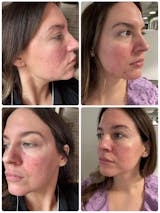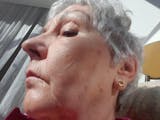Ah, acne.
You may be all too familiar with it as your constant companion throughout high school. Perhaps you grew out of it as you entered adulthood – only to have it return now. Or perhaps it never left you.
While in adult cases of acne, women are affected more frequently than men1, these red spots and bumps are a very real concern for many, regardless of gender. In fact, as male skin differs from female skin, you may find that you experience worse breakouts than your female friends.
So how can men take better care of their acne-prone skin?
First, we need to understand why you get acne in the first place.
What Causes Acne in Men?
At the root of all acne is a clogged pore, which happens when excess oil mixes with dead skin cells to create a sticky plug. This is the same for males and females.
For men with acne, changes in testosterone levels are often the biggest trigger. Testosterone is a key androgen (male sex hormone) responsible for giving males their traditionally masculine characteristics, such as a deep voice and bigger muscles. The hormone also stimulates the production of sebum, which means an increase in testosterone may lead to excess oil being produced. This in turn leads to clogged pores and breakouts2.
In fact, research has found that acne patients produced higher rates of testosterone in their skin than people without acne3.
Levels of this hormone tend to rise during puberty for boys (and girls), which is why so many teens get acne. While women have testosterone too, men produce more, and factors such as stress, exercise, age, and genes can affect the level of testosterone in your body.
More Factors That Can Lead to Acne in Men
-
Diet
While the acne-diet connection isn’t yet clear-cut, research has shown that consuming a lot of high-glycemic foods and cow’s milk may contribute to acne. -
Genetics
If your parents have acne, you’re more likely to have it too! -
Steroids
Taking anabolic steroids or corticosteroid medications can lead to higher testosterone levels and cause acne flare-ups4. -
Facial Hair
Rocking a beard or mustache? Check if your facial hair may be trapping bacteria and oil. -
Sweat
Sweating, whether from the summer sun or exercise, may make acne worse. -
Stress
When you’re emotionally stressed, your body makes extra hormones that can cause breakouts5. -
The Wrong Skincare Products
Using products that are too harsh on your skin or that contain pore-clogging ingredients may be the culprit. -
Greasy Hair Products
Similar to skincare products, if you use hair care products that are too oily, they can get onto your face and clog up your pores– leading to acne.
9 Things to Do for Clear, Healthy Skin
- Identify your skin type.
Knowing your skin type will help you better care for your skin. Your skin may be dry and flaky, oily and shiny, or a combination of both. It could also be oily but dehydrated, or even sensitive. Check out this easy guide to determining your skin type to start!
- Go for acne-friendly skincare products.
Take extra care when buying new skincare products. Check the labels to make sure they are non-comedogenic (meaning they won’t clog pores) and look through the ingredients list for potential irritants, such as fragrances.
Designed for acne-prone and sensitive skin, you can rest assured that the Clearly Basics line is 100% non-comedogenic and kind to skin.
- Wash your face twice a day with a gentle cleanser.
Give your skin a thorough cleanse without overstripping it of its natural oils and irritating it. Choose from So Fresh (for all skin types) or Balancing Cleanser (for oily skin), and remember to wash your face with lukewarm – not hot – water.
- Use retinol.
Retinol is the gold standard when it comes to clearing acne-causing clogged pores. Clear Out is our revolutionary retinol-powered lotion. Apply it once every night to flush out the clogs and make skin less acne-prone.
- Moisturize – yes, even when you have oily skin.
Use a lightweight, oil-free moisturizer such as the Matte Hydrator. As a hyaluronic acid serum, it can keep your skin nourished so that it won’t become so dry it compensates by producing even more pore-clogging oil.
- Remember your sunscreen.
No skincare routine is complete without sunscreen. Go for a lightweight, broad-spectrum one with at least SPF 35+ and a PA+++ rating.
- Take extra care when shaving.
Always use a clean razor and shave in the direction of hair growth. You can also moisturize before and after you shave to help minimize irritation. Use the antioxidant-rich Protective Moisturizer to calm redness, reduce skin sensitivity, and strengthen your skin barrier.
- Adopt a healthy lifestyle.
Living healthy overall can help improve your skin. Get plenty of sleep, exercise regularly, eat well, and schedule plenty of time to rest and de-stress.
- Mind the sweat when exercising.
To prevent the heat and sweat from making acne worse, use a towel to gently pat sweat off during your workout and wash your face after. Add in a shower if possible and change into clean clothes.
Have questions about what Clearly Basics can do for your skin?
We’re here to help! Get in touch with us via Messenger chat or Instagram DM (@clearlybasics).
References
- Emil A. Tanghetti et al., 2014: Understanding the Burden of Adult Female Acne
- Aimee Eyvazzadeh, 2019: Can Testosterone Trigger Acne?
- Evgenia Makrantonaki et al., 2011: An update on the role of the sebaceous gland in the pathogenesis of acne
- Cleveland Clinic, 2018: When Should Men See a Dermatologist for Adult Acne?
- Young Men's Health, 2019: Acne
Disclaimer: This article should not be interpreted as personal medical advice. For medical-related matters, please consult your dermatologist.






